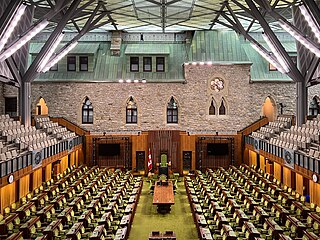The electoral threshold, or election threshold, is the minimum share of votes that a candidate or political party requires before they become entitled to representation or additional seats in a legislature.

The House of Commons of Canada is the lower house of the Parliament of Canada. Together with the Crown and the Senate of Canada, they comprise the bicameral legislature of Canada.
A member of parliament (MP) is the representative in parliament of the people who live in their electoral district. Members of parliament typically form parliamentary groups, sometimes called caucuses, with members of the same political party. Many countries with bicameral parliaments, this term refers only to members of the lower house since upper house members often have a different title. The terms congressman and deputy are equivalent terms used in other jurisdictions.
A by-election, also known as a special election in the United States and the Philippines, or a bypoll in India, is an election used to fill an office that has become vacant between general elections.

The Australian Senate is the upper house of the bicameral Parliament of Australia, the lower house being the House of Representatives.

The Parliament of Northern Ireland was the home rule legislature of Northern Ireland, created under the Government of Ireland Act 1920, which sat from 7 June 1921 to 30 March 1972, when it was suspended because of its inability to restore order during the Troubles, resulting in the introduction of direct rule. It was abolished under the Northern Ireland Constitution Act 1973.
In government, several constitutional arrangements use reserved political positions, especially when endeavoring to ensure the rights of women, minorities or other segments of society, or preserving a political balance of power.

The Grand National Assembly of Turkey, usually referred to simply as the TBMM or Parliament, is the unicameral Turkish legislature. It is the sole body given the legislative prerogatives by the Turkish Constitution. It was founded in Ankara on 23 April 1920 amid the National Campaign. This constitution had founded its pre-government known as 1st Executive Ministers of Turkey in May 1920. The parliament was fundamental in the efforts of Mareşal Mustafa Kemal Atatürk, 1st President of the Republic of Turkey, and his colleagues to found a new state out of the remnants of the Ottoman Empire.

The South Carolina Senate is the upper house of the South Carolina General Assembly, the lower house being the South Carolina House of Representatives. It consists of 46 senators elected from single member districts for four-year terms at the same time as United States presidential elections.

Elections in Kenya take place within the framework of a multi-party democracy and a presidential system. The President, Senate and National Assembly are directly elected by voters, with elections organised by the Independent Electoral and Boundaries Commission (IEBC).

Elections in Gabon take place within the framework of a presidential multi-party democracy with the Gabonese Democratic Party, in power since independence, as the dominant party. The President and National Assembly are directly elected, whilst the Senate is indirectly elected.
Elections in the Philippines are of several types. The president, vice-president, and the senators are elected for a six-year term, while the members of the House of Representatives, governors, vice-governors, members of the Sangguniang Panlalawigan, mayors, vice-mayors, members of the Sangguniang Panlungsod/members of the Sangguniang Bayan, barangay officials, and the members of the Sangguniang Kabataan are elected to serve for a three-year term.
An independent politician or non-affiliated politician is a politician not affiliated with any political party or bureaucratic association. There are numerous reasons why someone may stand for office as an independent.

Federal elections were held in Belgium on 10 June 2007. Voters went to the polls in order to elect new members for the Chamber of Representatives and Senate.

The 1906 Australian federal election was held in Australia on 12 December 1906. All 75 seats in the House of Representatives, and 18 of the 36 seats in the Senate were up for election. The incumbent Protectionist Party minority government led by Prime Minister Alfred Deakin retained government, despite winning the fewest House of Representatives votes and seats of the three parties. Parliamentary support was provided by the Labour Party led by Chris Watson, while the Anti-Socialist Party, led by George Reid, remained in opposition.

Senate of the Republic was the upper house of Turkish Parliament between 1961 and 1980. It was established with the Turkish constitution of 1961 and abolished with the 1982 constitution, although it did not exist after 12 September 1980 as a result of the 1980 coup d'état.
Senate elections were held in Turkey on 15 October 1961. In this election 150 members of the senate were elected by first-past-the-post system. The result was surprising because the party with second greatest number of votes nationwide won twice as many seats as the leading party.

The Republican Villagers Nation Party, alternatively translated Republican Peasants' Nation Party, was a political party in Turkey.

The 1858 United States elections occurred in the middle of Democratic President James Buchanan's term and marked the end of the transitional period between the Second Party System and the Third Party System. Members of the 36th United States Congress were chosen in this election. In the first election since the Supreme Court decided Dred Scott v. Sandford, the Republican Party won a plurality in the House, taking control of a chamber of Congress for the first time in the party's history. Although Democrats lost control of the House, they retained their majority in the Senate.
The electoral system of Turkey varies for general, presidential and local elections that take place in Turkey every five years. Turkey has been a multi-party democracy since 1950, with the first democratic election held on 14 May 1950 leading to the end of the single-party rule established in 1923. The current electoral system for electing Members of Parliament to the Grand National Assembly has a 7% election threshold.












